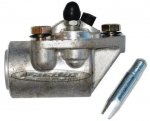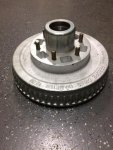ajgraz
Lieutenant Commander
- Joined
- Mar 1, 2010
- Messages
- 1,858
17' CC on a galvanized single axle LoadRite trailer (believe to be model year 2000), total loaded weight of entire rig (hull, motor, trailer, gas, batteries, gear, etc.) is ~2800#
Recently replaced the springs because the originals were shot; went ahead and upgraded to a new Dexter EZ Lube 3500# axle while I was at it, since LoadRite apparently believes that 1" inner bearings makes for a 2700# axle, while the entire rest of the world calls that a 2000# axle. (Also, inner seal surface on spindles worn and no longer sealing grease.)
New axle has standard brake mounting flanges.
Never had a trailer with brakes before, but I'm thinking about adding surge brakes for an added safety factor (I tow with an old Dodge Dakota). In general, I know that disc brakes are better than drum brakes (at least in automotive applications)...but according to Champion Trailers, trailer under 3000# actually does better with drums than discs, because the lower weight can't apply enough surge pressure for discs:
https://www.championtrailers.com/dis...s-drum-brakes/
So first question: does anybody buy that argument?
(EDIT: use is 100% saltwater, if that impacts the decision)
Recently replaced the springs because the originals were shot; went ahead and upgraded to a new Dexter EZ Lube 3500# axle while I was at it, since LoadRite apparently believes that 1" inner bearings makes for a 2700# axle, while the entire rest of the world calls that a 2000# axle. (Also, inner seal surface on spindles worn and no longer sealing grease.)
New axle has standard brake mounting flanges.
Never had a trailer with brakes before, but I'm thinking about adding surge brakes for an added safety factor (I tow with an old Dodge Dakota). In general, I know that disc brakes are better than drum brakes (at least in automotive applications)...but according to Champion Trailers, trailer under 3000# actually does better with drums than discs, because the lower weight can't apply enough surge pressure for discs:
https://www.championtrailers.com/dis...s-drum-brakes/
So first question: does anybody buy that argument?
(EDIT: use is 100% saltwater, if that impacts the decision)
Last edited:





















